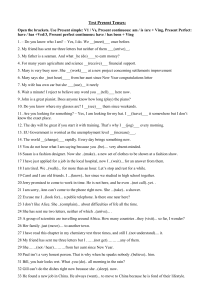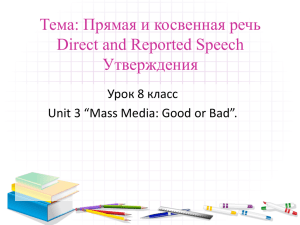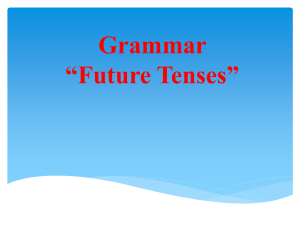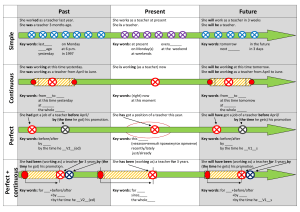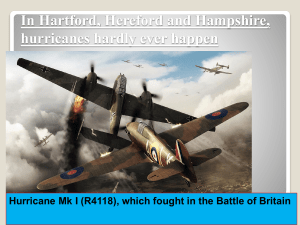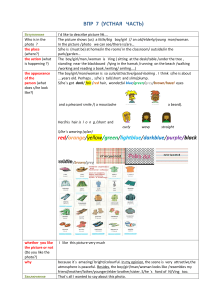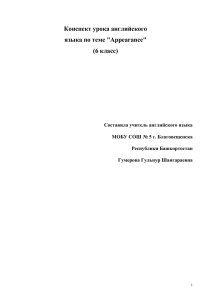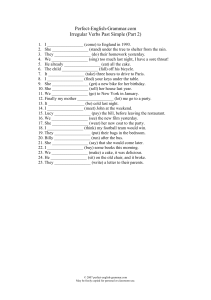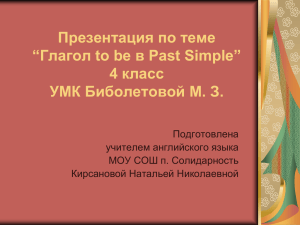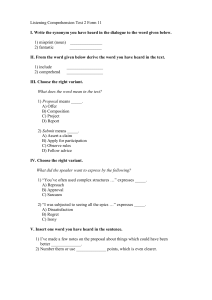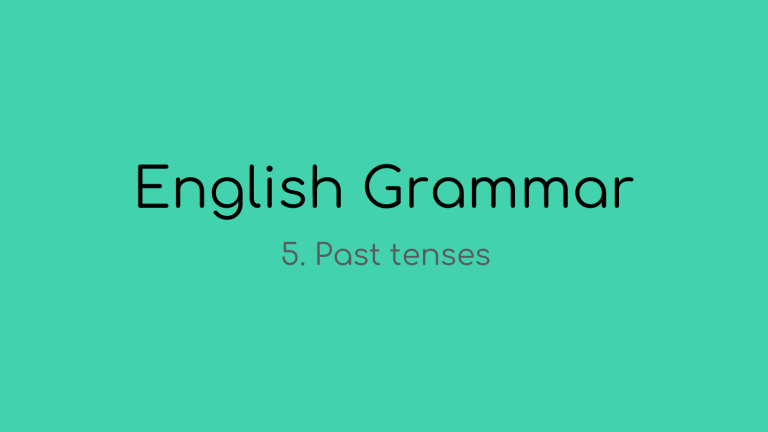
English Grammar 5. Past tenses Past Simple ● Complete past actions with a fixed time phrase: The Titanic sank in 1912 I drove back from London last night ● Past actions which happened one immediately after the other: She stood up, went up to her and grabbed her wrists ● Happened regularly in the past: Matthew spent most weekends at tennis tournaments She burst into tears every time she heard his name Study - studied, but play - played Stop - stopped, refer - referred Past Continuous ● Events in the past that had a longer duration than another action: I was cutting up vegetables in the kitchen when I heard it on the six o’clock news ● Two or more simultaneous past actions of a certain duration: I was reading while my brother was listening to me ● Background description to events in a strong description: As he was walking through the woods, the birds were singing and the sun was shining brightly Signal words affirmative negative General / Special questions Past Simple Past Continuous yesterday, the day before yesterday, last week (month, year, etc), a week (a month, a year, etc.) ago, the other day, in 1990, once, when at 5 o’clock yesterday, from 5 till 6 yesterday, the whole evening (morning) yesterday, at this time yesterday, when mother came home, while, still S + V2 I/He/She/It + was + Ving We/You/They + were + Ving S + didn’t + V I/He/She/It + wasn’t + Ving We/You/They + weren’t + Ving (WH) + Did + S + V …? (WH) + Was/Were + S + Ving …? Used to vs Would ● Used to (+ inf) expresses past habits or states: Stacey used to live in Brighton Did you use to suck your thumb when you were a baby? ● Would (+inf) expresses past repeated actions and routines Every day, I would wake up early and take a shower ● Get/Be used to doing = be/get accustomed to When I met Alan I was used to living alone and I didn’t want any flat mates I’m getting used (I am being used) to driving this car I have got used (have been used) to having lunch at work Present Perfect (have/has V3) ● Actions started in the past but are still true or continuing: We’ve lived here for eight years ● Happened in the past but have an effect in the present: They’ve cancelled tonight’s concert so we’ll have to do something else ● Signal words: ever, never, just, already, yet, recently, lately, before, always, so far, today, this week (month, year, etc), since, for, how long, etc. Past Perfect (had + V3) ● a past action which occurred before another action or before a stated past time: She had typed all letters by 10 o’clock ● Complete past actions which had visible results in the past: She was crying because she had lost her job ● The past equivalent of Present Perfect He is tired. He has painted the room He was tired. He had painted the room ● Signal words: for, since, already, after, just, never, yet, before, by, by the time, etc. Present Perfect Continuous (have/has been Ving) ● Actions started in the past and continuing up to the present: I’ve been studying for the Maths test for three hours ● Past actions of certain duration having visible results or effects in the present: She has been lying in the sun and now she has sunburn ● Expressing anger, irritation, annoyance, explanation or criticism He has been playing that horrible music all day long ● Signal words: ever, never, just, already, yet, recently, lately, before, always, so far, today, this week (month, year, etc), since, for, how long, etc. Past Perfect Continuous (had been + Ving) ● a past action which occurred before another action or before a stated past time: He had been working in Brussels for 3 years before he moved to London ● Past actions of certain duration which had visible results in the past: Her feet were swollen as she had been walking all day ● The past equivalent of Present Perfect Continuous I’m tired. I’ve been gardening all afternoon I was tired. I had been gardening all afternoon ● Signal words: for, since
